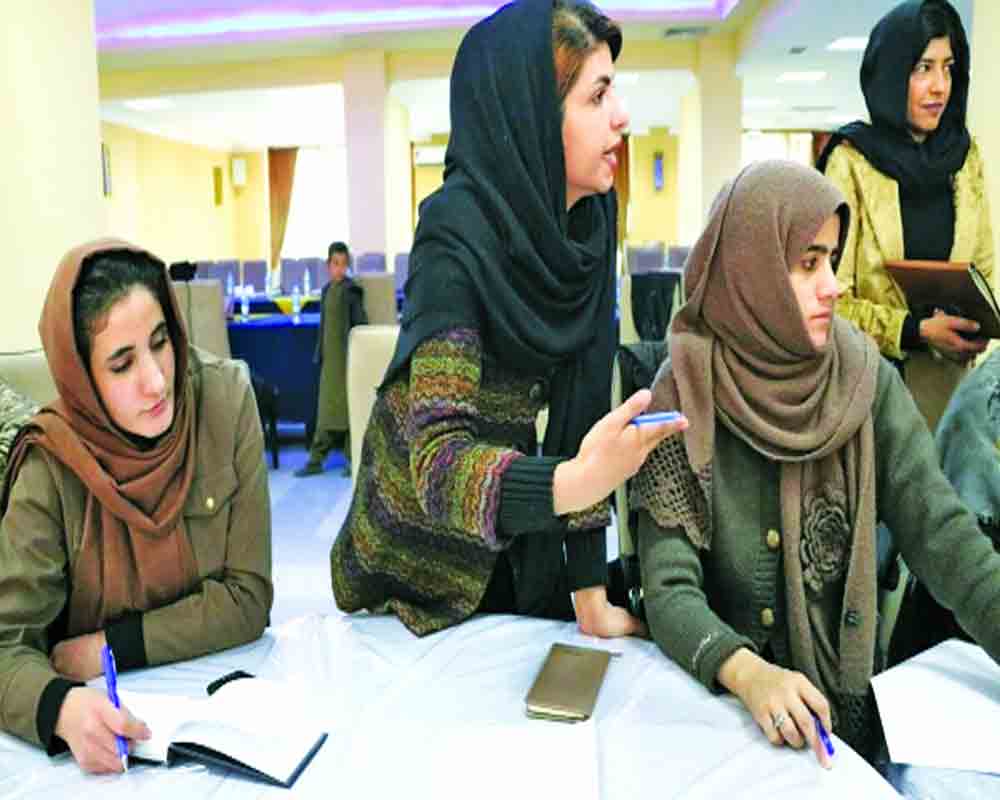The Taliban are out to debar women in Afghanistan from reaching college and want them to remain confined to the four walls of their home
While the attention of most countries remains riveted to the developments in Ukraine, the Taliban have scripted a new chapter in their continued assault on women's right to education. Girls appearing in the national university entrance examination this year found a number of subjects off-limits. According to a recent BBC report by Hafizullah Maroof titled "Afghanistan: Taliban bar women from many university subjects," faculties open to girls vary from university to university and in different zones in which the Taliban have divided Afghanistan. While they are allowed to take medicine, nursing, literature, and Islamic studies in all zones, they are generally barred from studying engineering, agriculture, economics, veterinary science, journalism and geology. Some courses in journalism are open to girls at Kabul University. Girls from other zones cannot access these.
Not surprisingly, there is despair and gloom among girls. Going by Maroof's report, there were 30,000 girls among the 100,000 who were expected to take the entrance examination this year. Their number, however, seems to be declining. To cite a straw in the wind, 182 of them sat for the exam in Laghman province this year against 1,200 in 2021. The number could be even lower next year if girls continue to be barred from secondary education with classes from seven to 12 shut to them.
The Taliban, of course, have been trying to convince people that the imposition of these restrictions is not a part of their drive to whittle down women's rights to education and work that has been underway since the time they captured power in August last year. Thus, according to Maroof's report, Abdul Qadir Khamosh, who heads the examination division of the Taliban Government's ministry of higher education, has said girls could choose their favourite subjects, with the exception of just three or four. The report quotes him as saying, "We need to provide separate classes for women. In some areas, the number of female candidates is [sic] low. So, we are not allowing women to apply for certain courses."
Such explanations are hardly credible. The latest restrictions have to be seen in the background of girls continuing to be barred from attending classes seven to 12 in schools despite demonstrations by women in Afghanistan and condemnation worldwide. The UN Secretary-General, Antonio Guterres, wrote on Twitter on September 18, 2022, the first anniversary of the school re-opening without girls, "A year of lost knowledge and opportunity that they [girls] will never get back. Girls belong to the school. The Taliban must let them back in." On the same day, Markus Potzel, acting head of the UN Assistance Mission in Afghanistan (UNAMA), stated, "The ongoing exclusion of girls from high school has no credible justification and has no parallel anywhere in the world….It is profoundly damaging to a generation of girls and to the future of Afghanistan."
There has also been criticism from within. Sher Mohammad Abbas Stanikzai, deputy minister for foreign affairs, told a Taliban gathering in Kabul on September 27, 2022, "It is very important that education must be provided to all, without any discrimination," He said, "Women must get education, there is no Islamic prohibition for girls' education…..Let's not provide opportunities for others to create a gap between the government and the people……If there are technical issues, that needs to be resolved.”
Stanikzai himself, however, seems to have been marginalized. Once the head of the Taliban team in talks that led to the agreement with the US on February 29, 2020, in Qatar, which, in retrospect, led to the Taliban's ascent to power in August 2021, he should certainly have got a much higher position. His remarks mentioned above have clearly had no impact; nor, by the look of things, is it likely to have any. A significant indication of this has been the replacement of Noorullah Munir, who reportedly favoured girls' education and was in charge when the Taliban Government announced the reopening of girls' schools in March 2022 (an announcement that has not been acted upon), on September 20 as education minister. His replacement, Habibullah Agha, who has reportedly had no formal education but is close to the Taliban's supreme leader, Hibatullah Akhundzada, will implement whatever order the latter hands down. He told the AFP on September 21, "We can't make any plans on our own. We don't do that. Rather, I would act according to the instructions given by the supreme leader."
The reclusive supreme leader, it is widely known, is opposed to girls' education. Clearly, women and girls in Afghanistan have a tough time ahead, particularly since the world is prepared to do little more than issue critical and/or condemnatory statements and the Taliban is making do without aid and its funds were frozen abroad.
(The author is Consulting Editor, The Pioneer. The views expressed are personal.)


























